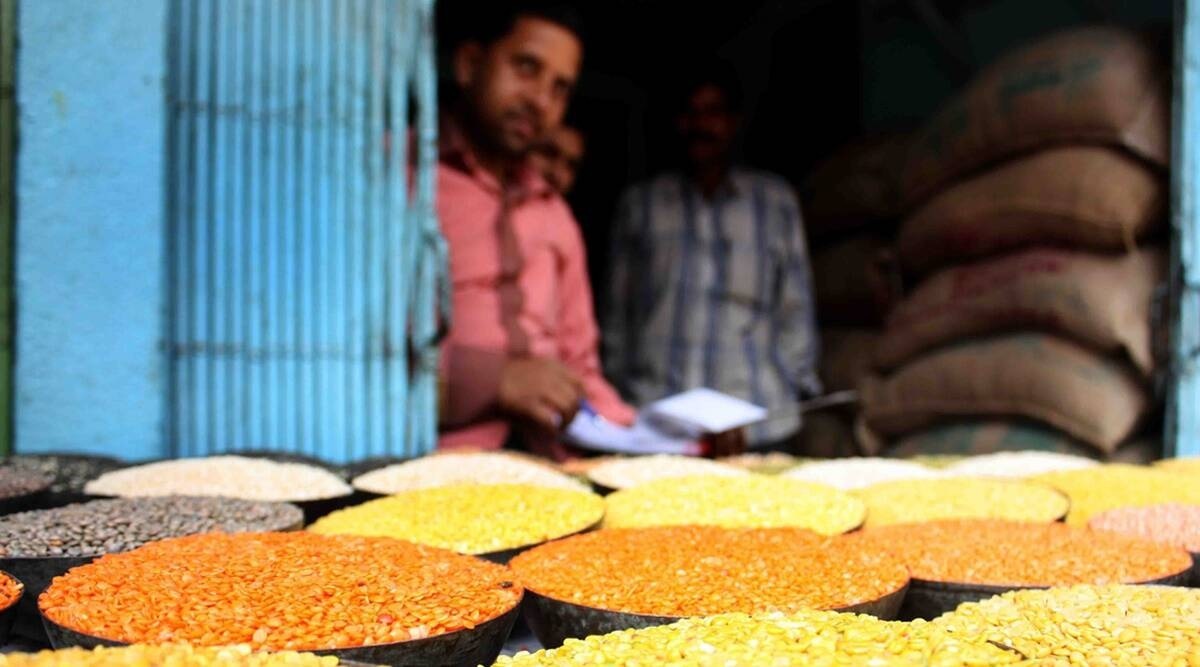 According to them, the stockholding limits go against the Essential Commodities (Amendment) Act, 2020.
According to them, the stockholding limits go against the Essential Commodities (Amendment) Act, 2020. FARMERS SAY that the recently imposed stockholding limits on pulses (barring moong and green gram) till October 31 by the Centre contradict its own farm laws.
For more than seven months now, farmers have been protesting against the Centre’s three farm laws at the Delhi border. Their demand is complete repeal of these legislations. According to them, the stockholding limits go against the Essential Commodities (Amendment) Act, 2020.
“Pulses are basic and essential food items in our country, but these have been excluded from the list of essential food items under the EC (Amendment) Act,” said Jagmohan Singh Patiala, general secretary, Bharti Kisan Union (BKU) Ekta (Dakaunda). “Farm unions have already pointed out that the new amended Act says that its purpose is ‘enhancing income of farmers’, but the Essential Commodities (EC) Act, 1955, was never about farmers or their incomes. It was about preventing agri-business companies and big traders — which have the means to stock farmers’ produce — from hoarding and then selling these at higher price at the time of shortage or by creating false shortage of such items, which are the basic requirement of every consumer, including the poor,” he added.
“But new Act has removed all these restrictions and given a free hand to agri business companies or traders to hoard such food commodities. This is why farmers are calling it the Food Hoarding (Freedom for Corporates) Act,” said Satnam Singh Sahni of Samyukat Kisan Morcha (SKM).
“Now when the government is imposing restrictions on stock limit to control the inflation of food commodities, it means that government itself wants to stop stockists from hoarding pulses and taking control of the market,” said another farm leader of SKM, Balbir Singh Rajewal, adding that price rise in retail market never benefits farmers but stockists, and badly impacts consumers, particularly the poor. “The government should realize this as soon as possible and repeal these laws,” he added.
“How can the government exclude cereals, pulses, oilseed, onion, potato from the list of essential commodities, when hoarding of these would lead to inflation? If the government needs to issue such stockholding limits orders often, then what was the need to include such clauses in the amended Act?” said Sukhdev Singh Kokrikalan, general secretary, BKU Ugrahan, adding that while the Act says that the government will regulate these commodities under extraordinary circumstances, prices are rising every coming day.
The Department of Consumer Affairs (DCA) had last week issued an order to impose stockholding limits on all pulses, barring moong or green gram, for a period up to October 31, 2021. The limits have been fixed at 200 tonnes for wholesale traders and importers, and 5 tonnes for retailers. The stock limit for processors/dal millers has been set at the last three months’ production or 25 per cent of annual installed capacity, whichever is higher.
‘Threat to food security’
Farmers said this is a threat to food security. “There used to be several regulatory tools with the government in the earlier ECA 1955 – licensing, price control, compulsory licensing, stocking, information collection and production for inspection records, entry/search/examination of premises and seizure etc. — but all of this is being thrown away now under the new law,” said Sahni.
“Not only is this Act is arbitrary but another farm law — the Contract Farming Act, 2020 — promotes hoarding under its section -7, which says ‘obligation related to stock limit shall not be applicable to such quantities of farming produce as are purchased under a farming agreement entered into in accordance with the provisions of this Act’,” said the All Indian Kisan Sangharsh Coordination Committee had said in its earlier statement sent to the Centre.
“Such a clause of the Contract farming Act is also arbitrary and it is again a proof of the government’s hasty decision of bringing such laws and overlapping the provisions of one law with the other to complicate the matter for every one,” said a farmer, adding that “the government should shun its ego in the larger interest of the poor of this country as well as farmers and general consumers”.
The Essential Commodities Act, 2020
- The Essential Commodities (Amendment) Ordinance, 2020 was promulgated on June 5, 2020. The Act “empowers the central government to control the production, supply, distribution, trade, and commerce in certain commodities. The Ordinance seeks to increase competition in the agriculture sector and enhance farmers’ income.”
- After the amendment, the supply of certain foodstuffs – including cereals, pulses, oilseeds, edible oils, potato – can be regulated only under extraordinary circumstances, which include an extraordinary price rise, war, famine, and natural calamity of a severe nature. In effect, the amendment takes these items out from the purview of Section 3(1), which gives powers to central government to “control production, supply, distribution, etc, of essential commodities”.
- The Indian Express website has been rated GREEN for its credibility and trustworthiness by Newsguard, a global service that rates news sources for their journalistic standards.

